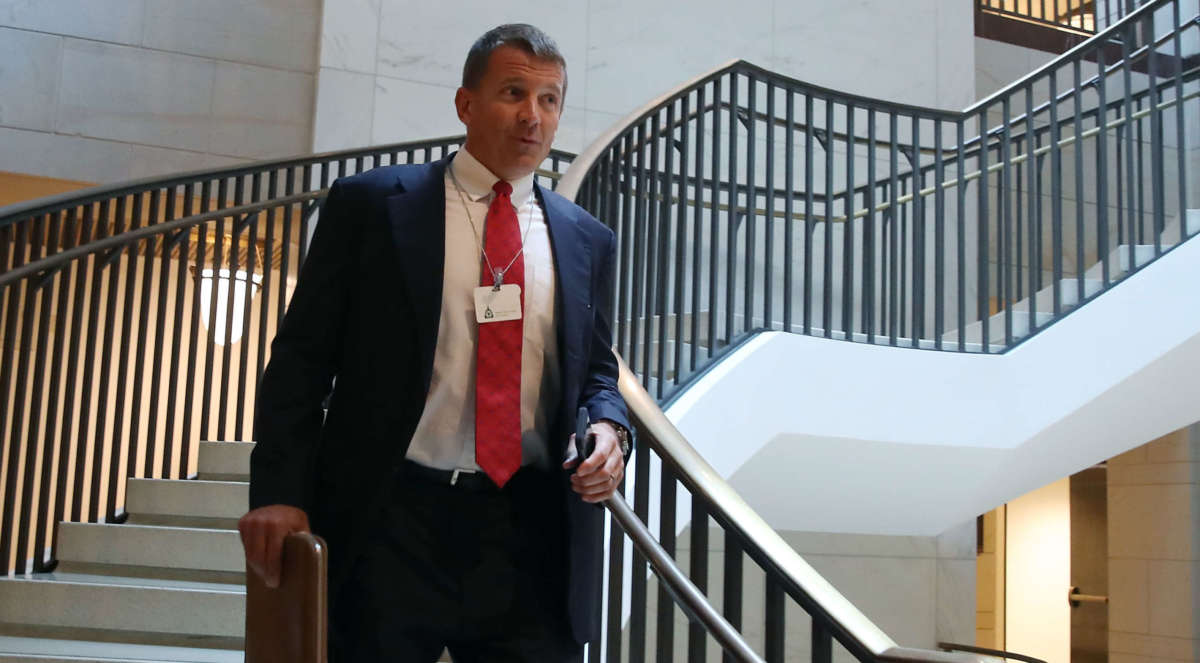Did you know that Truthout is a nonprofit and independently funded by readers like you? If you value what we do, please support our work with a donation.
Erik Prince, the founder and former CEO of the mercenary firm Blackwater and a close ally of former President Donald Trump, sent weapons to a Libyan warlord in violation of a United Nations arms embargo, according to a confidential U.N. document reported Friday by the New York Times.
The U.N. report, which investigators sent to the Security Council on Thursday, reportedly details how Prince sent foreign mercenaries armed with attack aircraft, gunboats, and cyberwarfare capabilities to support renegade military commander Khalifa Haftar during a major 2019 battle in eastern Libya.
According to the U.N. report, the mercenary operation cost $80 million and included a plan to form a hit squad to locate and assassinate commanders opposed to Haftar.
Haftar, a one-time CIA asset considered Libya’s most powerful warlord, has fought to overthrow the North African nation’s internationally recognized government during the country’s second civil war since the overthrow of longtime dictator Muammar Gaddafi in the 2011 Arab Spring revolts. Haftar has enjoyed various degrees of support from Egypt, the United Arab Emirates, and Russia. British, French, U.S., and UAE warplanes have also assisted his forces.
Erik Prince, the former head of Blackwater, brother of Betsy DeVos and prominent supporter of Donald Trump, violated a UN arms embargo on Libya by sending weapons to a militia commander who was attempting to overthrow the internationally backed government. https://t.co/uYY1ly4Nkf
— Citizens for Ethics (@CREWcrew) February 19, 2021
In 2019, Trump reportedly granted permission for Haftar — who stands accused of ordering his troops to commit war crimes — to launch an air campaign against the U.N.-backed Government of National Accord, attacks which killed hundreds of civilians in the Libyan capital of Tripoli.
The U.N. report raises questions about whether Trump was complicit in Prince’s violation of the international arms embargo against Haftar’s forces.
Anas el-Gomati, director of Libyan think tank Sadeq Institute, told Al Jazeera that using mercenaries allows leaders to “outright refuse that you have any knowledge of what’s going on.”
“To what degree did Trump help facilitate this war alongside Erik Prince?” asked el-Gomati, who also wondered whether “Erik Prince was coordinating with Russian Wagner Group mercenaries in Libya, and has helped them establish a foothold in the way he helped the United Arab Emirates establish a foothold in Libya.”
Another unanswered question is who funded Prince’s $80 million operation. Wolfram Lacher, a Libya expert at the German Institute for International and Security Affairs, told the Times that Prince has “been linked to the Trump administration, the Emirati leadership, and the Russians.”
“For me, the question is who is tacitly backing him?” asked Lacher.
BREAKING: A UN report says Betsy DeVos' brother Erik Prince violated an int'l arms embargo on Libya by deploying a force of mercenaries to help a militia leader try to overthrow the gov't, according to reporting by @nytimes. Here's what else you need to know about the Trump ally pic.twitter.com/VTxqYVTsPN
— NowThis Impact (@nowthisimpact) February 19, 2021
Prince, a former U.S. Navy SEAL, founded Blackwater — now called Academi after being sold twice — in 1997. He rose to prominence during the George W. Bush administration and the so-called War on Terror, in which the U.S. relied heavily upon private contractors. On September 16, 2007, Blackwater guards massacred 17 men, women, and children in Nisour Square in Baghdad, Iraq.
Last December, Trump pardoned four of the Nisour Square killers, who had been sentenced to 12 years to life in prison for crimes including first-degree murder.
Trump and Prince have long enjoyed warm relations. Prince was a major Trump donor whose sister, Betsy DeVos, was confirmed as secretary of education in 2017.
This isn’t the first time Prince has been accused of breaking domestic and international laws against weapons transfers. In 2012 his anti-piracy security force in Somalia was accused by the U.N. of “the most brazen violation of the arms embargo by a private security company.” Prince was also reportedly the target of an FBI investigation last year for weaponizing crop dusters.
A terrifying moment. We appeal for your support.
In the last weeks, we have witnessed an authoritarian assault on communities in Minnesota and across the nation.
The need for truthful, grassroots reporting is urgent at this cataclysmic historical moment. Yet, Trump-aligned billionaires and other allies have taken over many legacy media outlets — the culmination of a decades-long campaign to place control of the narrative into the hands of the political right.
We refuse to let Trump’s blatant propaganda machine go unchecked. Untethered to corporate ownership or advertisers, Truthout remains fearless in our reporting and our determination to use journalism as a tool for justice.
But we need your help just to fund our basic expenses. Over 80 percent of Truthout’s funding comes from small individual donations from our community of readers, and over a third of our total budget is supported by recurring monthly donors.
Truthout has launched a fundraiser, and we have a goal to add 231 new monthly donors in the next 48 hours. Whether you can make a small monthly donation or a larger one-time gift, Truthout only works with your support.
